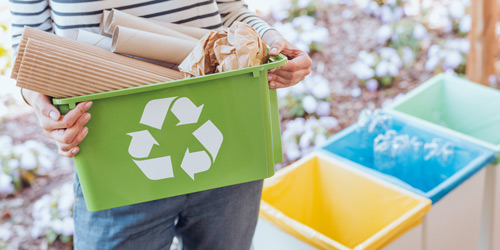What Can & Can’t Go in Your Recycling Bin?

We’ve all been there: standing over the recycling bin with something in hand, wondering, “Does this go in, or should it be tossed in the trash?”
From greasy pizza boxes to plastic takeout containers, the rules around recycling can feel like a confusing puzzle with constantly shifting pieces. However, while tossing a questionable item in the bin may not seem like a big deal, improper recycling has real consequences.
Contaminating your recycling bin can disrupt local sorting processes, increase community costs, and ultimately send more waste to the landfill, defeating the entire purpose of recycling.
At Van’s Sanitation & Recycling, we’re here to help you sort it all out. With the right knowledge, you can make smarter choices that support a cleaner, greener Plymouth County.
Let’s dive into what can and can’t go in your bin — and why it matters.
Commonly Accepted Items in Your Bin
Let’s start with the good stuff: the items you can confidently toss in your recycling bin in most Iowa areas, including here in Plymouth County.
Paper & Cardboard
- Newspaper, office paper, junk mail
- Cardboard boxes (flattened)
- Paperboard (like cereal boxes)
- Magazines and catalogs
Just ensure these items are clean and dry — wet or food-soiled paper can’t be recycled.
Plastic Containers (#1–#7)
- Water and soda bottles
- Milk jugs
- Shampoo bottles
- Yogurt containers
Be sure to rinse containers before recycling. Labels are fine, but food residue? Not so much.
Glass Bottles & Jars
- Clear, brown, and green glass containers are accepted
- Lids can be tossed separately (metal lids may be recyclable)
Broken glass, ceramics, or Pyrex? Skip it — those don’t belong in the bin.
Metal Cans
- Aluminum soda cans
- Tin and steel food cans
Again, rinsing is key. And don’t worry — pull tabs and labels don’t need to be removed.
Things That Seem Recyclable But Aren’t
Some items feel recyclable because they look like they should be. Unfortunately, that’s not always the case.
Here's a list of common culprits that don’t belong in your curbside recycling bin:
Greasy Pizza Boxes
While cardboard is recyclable, oil and food residue compromise the process. If only part of the box is clean, tear off the clean section and recycle that.
Coffee Cups & To-Go Containers
Paper coffee cups often have a plastic lining that makes them non-recyclable. Most takeout containers are contaminated with food or made of non-recyclable plastic.
Frozen Food Boxes
Although they may look like cardboard, many are coated with plastic to resist moisture and are not accepted in standard recycling.
Toys, Hoses, & Cords
These items cause problems at recycling facilities by jamming machinery. Donate them or dispose of them properly instead.
The Trouble With Plastic Bags & Styrofoam
Let’s talk about two of the biggest problem items in the recycling world.
Plastic Bags
While technically recyclable, plastic bags should never be placed in your curbside bin. They tangle in recycling equipment, slow down operations, and create safety hazards for workers.
Many grocery stores and retailers have designated drop-off bins for these bags — take them there instead.
Styrofoam
Styrofoam (aka expanded polystyrene) is lightweight, easily contaminated, and very difficult to recycle. It breaks into tiny pieces that scatter and clog sorting machines.
Most recycling centers, including Van’s, do not accept Styrofoam.
If you receive a Styrofoam-packed delivery, consider reusing it or disposing it in the trash.
How Contamination Affects Local Recycling Programs
Every time something non-recyclable ends up in the recycling stream, it threatens the success of the whole system.
Here’s how:
- It slows down sorting: Workers must manually remove contaminants, increasing time and cost.
- It increases landfill waste: Contaminated batches may be too spoiled to process and dumped altogether.
- It drives up program costs: Contamination makes recycling less efficient and more expensive for municipalities and providers.
In other words, wish-cycling (putting something in the bin just hoping it’s recyclable) does more harm than good.
Tips to Keep Your Recycling Clean & Sorted
A few extra seconds of prep can go a long way in making recycling work better for everyone:
- Rinse all containers to remove food and liquid
- Keep recyclables loose, not bagged
- Flatten cardboard boxes to save space
- Remove plastic liners or packaging from boxes
- Only recycle items you know are accepted
When in doubt, check with your provider. (Hey, that’s us!).
Van’s Sanitation's Guidelines: What We Accept
At Van’s Sanitation & Recycling, we’re proud to offer residential and commercial recycling services throughout Plymouth County.
Our recycling program is designed to make the process easy, efficient, and effective for households and businesses alike.
Here’s a quick recap of what we currently accept:
- Plastics #1–#7 (no plastic bags)
- Cardboard and paperboard (clean and dry)
- Newspapers, office paper, magazines
- Tin and aluminum cans
- Glass bottles and jars (no broken glass)
We do not accept:
- Plastic bags
- Styrofoam
- Batteries
- Hazardous waste
- Electronics (please contact us for proper disposal info)
Feel free to reach out or check our website for a full list or to clarify specific items. We’re always happy to help!
Let Van’s Handle the Heavy Lifting!
At Van’s Sanitation & Recycling, we’ve been helping families, businesses, and communities throughout Plymouth County recycle smarter for over 20 years.
Whether you need curbside pickup, commercial recycling programs, or custom solutions for your workplace, our experienced team is here to make recycling easy — and to keep it local.
Contact us today to set up residential or commercial recycling service, ask a question, or get a list of what’s accepted in your bin. Let’s work together for a cleaner, greener Iowa!